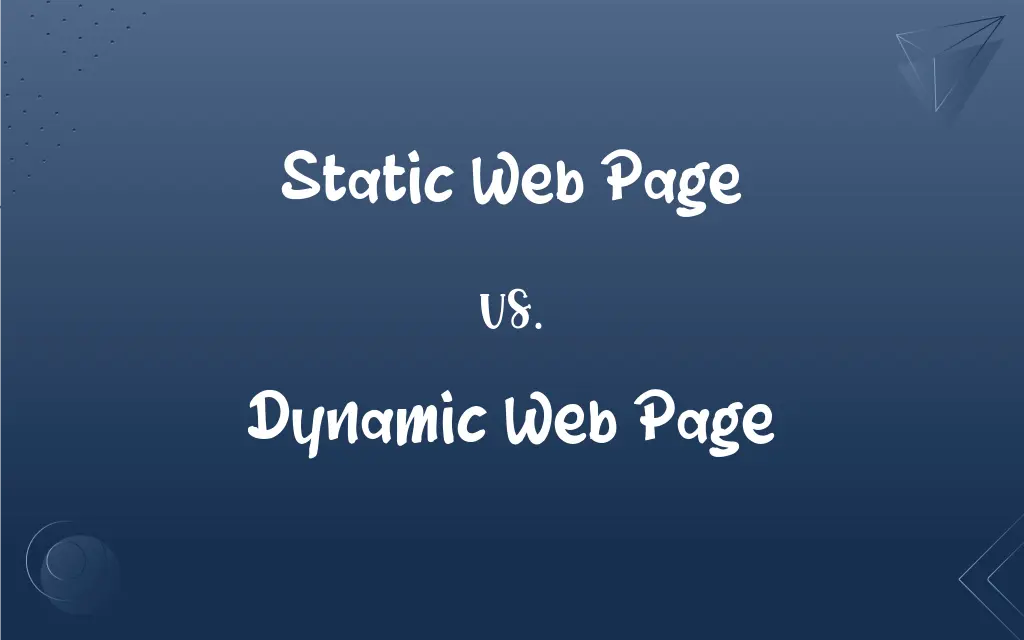Static Web Page vs. Dynamic Web Page: What's the Difference?
Edited by Janet White || By Harlon Moss || Updated on October 12, 2023
A static web page displays fixed content identical for all users, while a dynamic web page generates variable content in response to user interaction or real-time changes.

Key Differences
Static web pages and dynamic web pages represent two fundamental approaches in website development and design. Static web pages deliver the same pre-stored content to every visitor without change, exhibiting consistency and uniformity across various user interactions. On the contrary, dynamic web pages adapt and alter content based on user interactions, preferences, or real-time changes, ensuring a personalized user experience.
From a technological standpoint, static web pages are usually written solely in HTML and CSS, thereby providing fixed, unchangeable content to all users. Dynamic web pages, however, involve server-side scripting languages like PHP, ASP, or JavaScript to dynamically generate content in real-time, offering a more interactive and user-specific display.
In terms of user engagement and interaction, static web pages might be seen as straightforward and direct, offering a stable and uniform user experience without variability. Contrastingly, dynamic web pages foster a more interactive, engaging, and user-centered experience, adjusting content, and possibly layout, in accordance with the user’s interaction or other variables.
Speed and loading time are also differentiating factors between static web pages and dynamic web pages. Static web pages tend to load faster as they don’t require any processing time to generate content. Dynamic web pages might exhibit a slower load time due to the requirement of generating different content for different user scenarios, which involves real-time processing and data retrieval.
Maintenance and update procedures for static web pages and dynamic web pages vary substantially. Static web pages often necessitate manual updates and are typically easier to maintain due to their simpler structure. Dynamic web pages, while potentially more complex to maintain, allow for broad updates and content changes to be made dynamically and instantaneously across all platform instances through updating algorithms or databases.
ADVERTISEMENT
Comparison Chart
Content Variation
Fixed for all users
Varies per user interaction/real-time data
User Interaction
Limited interaction & personalization
High interaction & personalization
Technology Used
Primarily HTML & CSS
Involves server-side scripting languages
Loading Time
Generally faster
Can be slower due to dynamic content gen.
Maintenance & Update
May require manual updates
Can be updated dynamically via databases
ADVERTISEMENT
Static Web Page and Dynamic Web Page Definitions
Static Web Page
A static web page is generally easier and straightforward to maintain and update.
He preferred deploying a static web page for the project due to its ease of maintenance.
Dynamic Web Page
A dynamic web page alters content and/or structure in real-time based on user interaction or input.
The dynamic web page displayed personalized greeting messages to users based on their account information.
Static Web Page
Static web pages are typically developed using just HTML and CSS.
She coded a clean and simple static web page using only HTML for structure and CSS for style.
Dynamic Web Page
Dynamic web pages often use databases to retrieve and display content dynamically.
The news website utilized a dynamic web page to display the latest articles from its database to visitors.
Static Web Page
Static web pages are often faster to load due to the absence of real-time content generation.
The event’s static web page loaded swiftly, providing immediate access to the schedule.
Dynamic Web Page
A dynamic web page enables personalized user experiences by adapting content and interactions.
The e-commerce platform’s dynamic web page showcased product recommendations based on user browsing history.
Static Web Page
A static web page presents the same unaltered content to every visitor.
The company’s static web page displayed its contact information identically to all users.
Dynamic Web Page
Dynamic web pages employ server-side scripting to generate variable content for different user scenarios.
Through utilizing PHP, the dynamic web page was able to display different products based on user search terms.
Static Web Page
A static web page does not change content or structure in response to user input.
Regardless of user location, the static web page showed the same product prices and details.
Dynamic Web Page
A dynamic web page can present different content without requiring a page reload.
The dynamic web page seamlessly updated weather information without necessitating a manual refresh by the user.
FAQs
How does a dynamic web page function?
A dynamic web page generates variable content based on user interactions or real-time inputs using server-side scripting.
Which is typically faster, a static or dynamic web page?
Generally, static web pages load faster since they do not require additional time to generate content dynamically.
Is database connectivity possible in dynamic web pages?
Yes, dynamic web pages can connect to databases to retrieve and display content dynamically.
Are static web pages interactive?
Static web pages are limited in interaction and primarily present fixed content without variation.
Are static web pages suitable for small websites?
Yes, static web pages are often suitable for smaller websites due to their simplicity and ease of maintenance.
Are static web pages SEO-friendly?
Static web pages can be SEO-friendly due to their straightforward structure and faster load times.
Can static web pages provide user analytics?
While user analytics can be obtained, static web pages offer limited user interaction and personalized data tracking compared to dynamic pages.
What is a static web page?
A static web page displays consistent, unchangeable content to every user.
Can dynamic web pages display real-time data?
Yes, dynamic web pages can display real-time data by retrieving and displaying information dynamically.
Can you update content globally on static web pages?
Updating content globally on static web pages generally requires manual changes to each page.
Do dynamic web pages allow user profiling?
Yes, dynamic web pages can create user profiles and personalize content based on user data and interactions.
Can e-commerce websites benefit from dynamic web pages?
Yes, e-commerce websites often utilize dynamic web pages to provide personalized, interactive, and real-time shopping experiences.
Is hosting static web pages typically cheaper?
Yes, hosting static web pages is often cheaper due to lower resource requirements compared to dynamic pages.
Can a dynamic web page adjust to user language preferences?
Yes, dynamic web pages can adapt content, including language, based on user preferences or location.
Are dynamic web pages ideal for content that changes frequently?
Yes, dynamic web pages are suitable for frequently changing content as they can update and display real-time information dynamically.
Can a dynamic web page display user-specific content?
Yes, dynamic web pages can personalize content based on user interactions, preferences, or behavior.
How are static web pages developed?
Static web pages are usually developed using HTML and CSS, without requiring server-side scripting.
How does a dynamic web page respond to user inputs?
A dynamic web page processes user inputs using server-side scripting to adjust and display relevant content.
Can static web pages display multimedia content?
Yes, static web pages can display multimedia content, but it will be fixed and identical for all users.
How secure are dynamic web pages?
Dynamic web pages, due to their interactivity and data processing, require robust security measures to protect user data and interactions.
About Author
Written by
Harlon MossHarlon is a seasoned quality moderator and accomplished content writer for Difference Wiki. An alumnus of the prestigious University of California, he earned his degree in Computer Science. Leveraging his academic background, Harlon brings a meticulous and informed perspective to his work, ensuring content accuracy and excellence.
Edited by
Janet WhiteJanet White has been an esteemed writer and blogger for Difference Wiki. Holding a Master's degree in Science and Medical Journalism from the prestigious Boston University, she has consistently demonstrated her expertise and passion for her field. When she's not immersed in her work, Janet relishes her time exercising, delving into a good book, and cherishing moments with friends and family.






























































